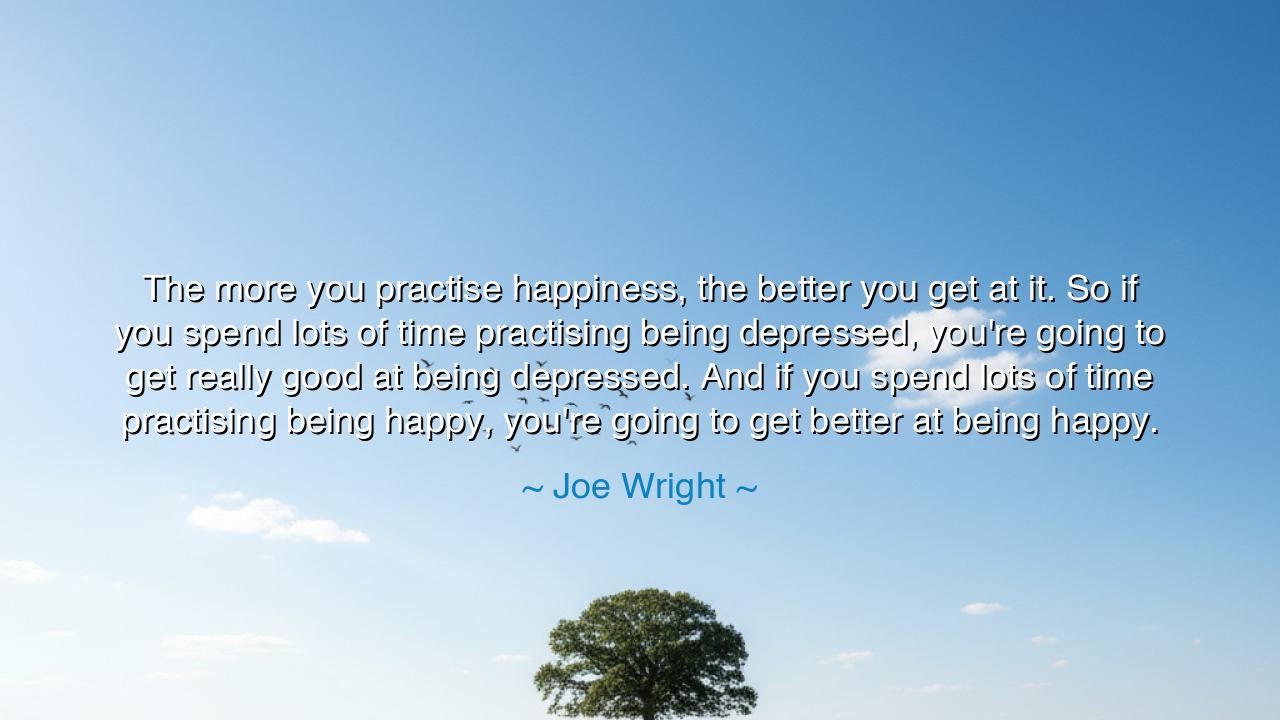
The more you practise happiness, the better you get at it. So if
The more you practise happiness, the better you get at it. So if you spend lots of time practising being depressed, you're going to get really good at being depressed. And if you spend lots of time practising being happy, you're going to get better at being happy.






“The more you practise happiness, the better you get at it. So if you spend lots of time practising being depressed, you're going to get really good at being depressed. And if you spend lots of time practising being happy, you're going to get better at being happy.” — Joe Wright
In these words, Joe Wright, the visionary storyteller, reminds us of a truth as ancient as the soul itself — that happiness is not a gift, but a discipline. It is not something bestowed upon the fortunate, nor withheld from the suffering. It is an art, a practice, a conscious shaping of the mind’s habit. Just as a musician must train their fingers, or a warrior must temper their strength through repetition, so must the spirit be trained to dwell in light rather than in darkness. The mind, like the hand, learns what it repeats. What we think, we become. What we rehearse, we perform.
The practice of happiness is not a denial of sorrow — rather, it is the mastery of one’s response to life’s trials. For each day offers both pain and beauty, shadow and flame, and we are the ones who choose which to cultivate. Those who dwell constantly upon their misfortunes weave deeper paths into their sorrow; their hearts become accustomed to despair as one becomes accustomed to a darkened room. But those who deliberately turn their gaze to gratitude, who seek the small joys even amid hardship, strengthen the muscles of joy until happiness becomes their second nature. Thus, Wright’s words are not mere comfort — they are instruction for the art of living.
The ancient philosophers spoke of this same discipline. The Stoics taught that peace is not the absence of suffering but the mastery of perception. Epictetus, once a slave, declared that a man’s chains cannot bind his soul unless he permits it. He practised contentment each day, until even in hardship he could smile with calm. So too does Wright echo that wisdom — that happiness is not found by waiting, but by training. You must teach your heart, again and again, to return to light when the world offers you darkness.
Consider the story of Helen Keller, who was struck blind and deaf as a child. She might have lived in bitterness, imprisoned by loss. Yet through perseverance, through the practice of joy, she learned not only to communicate but to inspire millions. “Keep your face to the sunshine,” she said, “and you cannot see the shadow.” Her life was proof that happiness, when cultivated, grows stronger than despair. She trained her spirit to find meaning in silence, beauty in struggle — and thus she became a beacon for all who walk through the night.
But the practice of happiness is not an easy art. It requires the same patience and devotion as any noble craft. You must rise each morning and choose your thoughts as a warrior chooses his armor. When the mind begins to wander toward worry, call it back. When bitterness whispers, answer with gratitude. When sadness visits, greet it with compassion, but do not let it linger longer than it must. For every thought is a seed, and the soil of your mind will bear fruit according to what you plant. To tend your garden well is the greatest act of self-mastery.
Understand, too, that the practice of happiness is not selfish — it is contagious. A joyful soul radiates strength, lifting the hearts of others. The one who has mastered contentment becomes a mirror in which others see their own potential for peace. This is why the wise cultivate inner calm: not only for their own sake, but for the harmony of all who walk beside them. To choose happiness, then, is to serve the world, for your light becomes the torch that helps others find their way.
So, O seeker of peace, take Joe Wright’s words to heart. Happiness, like any skill, must be practised. Begin where you are. Each time you smile despite the storm, you are training your soul. Each time you give thanks, you are strengthening your spirit. Do not wait for joy to descend from the heavens — build it, breath by breath, thought by thought, act by act. For in the end, happiness is not the absence of pain, but the triumph of the human heart that has learned, through practice, to turn sorrow into song. And the more you practise this art, the greater your song shall be.






AAdministratorAdministrator
Welcome, honored guests. Please leave a comment, we will respond soon